Onibaba Blu-ray Movie
HomeOnibaba Blu-ray Movie 
鬼婆Criterion | 1964 | 103 min | Not rated | Oct 05, 2021
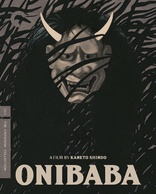
Movie rating
7.8 | / 10 |
Blu-ray rating
| Users | 0.0 | |
| Reviewer | 4.0 | |
| Overall | 4.0 |
Overview
Onibaba (1964)
Deep in the windswept marshes of war-torn medieval Japan, an impoverished older woman and her daughter-in-law murder lost samurai and sell their belongings for the most meager of sustenance. When a bedraggled neighbor returns from battle, lust, jealousy, and rage threaten to destroy the trio’s tenuous existence, before an ominous, ill-gotten demon mask seals their horrifying fate.
Starring: Nobuko Otowa, Jitsuko Yoshimura, Kei Satô, Jűkichi Uno, Taiji TonoyamaDirector: Kaneto Shindô
| Foreign | Uncertain |
| Drama | Uncertain |
| Horror | Uncertain |
| Supernatural | Uncertain |
Specifications
Video
Video codec: MPEG-4 AVC
Video resolution: 1080p
Aspect ratio: 2.39:1
Original aspect ratio: 2.35:1
Audio
Japanese: LPCM Mono (48kHz, 24-bit)
Subtitles
English
Discs
Blu-ray Disc
Single disc (1 BD)
Playback
Region A (locked)
Review
Rating summary
| Movie | 4.5 | |
| Video | 4.0 | |
| Audio | 4.0 | |
| Extras | 3.0 | |
| Overall | 4.0 |
Onibaba Blu-ray Movie Review
Reviewed by Dr. Svet Atanasov September 17, 2021Kaneto Shindo's "Onibaba" a.k.a. "The Demoness" (1964) arrives on Blu-ray courtesy of Criterion. The supplemental features on the disc include original Japanese theatrical trailer; on-set footage shot by actor Kei Sato; and an audio commentary by director Kaneto Shindo and actors Kei Sato and Jitsuko Yoshimura; and more. In Japanese, with optional English subtitles for the main feature. Region-A "locked".
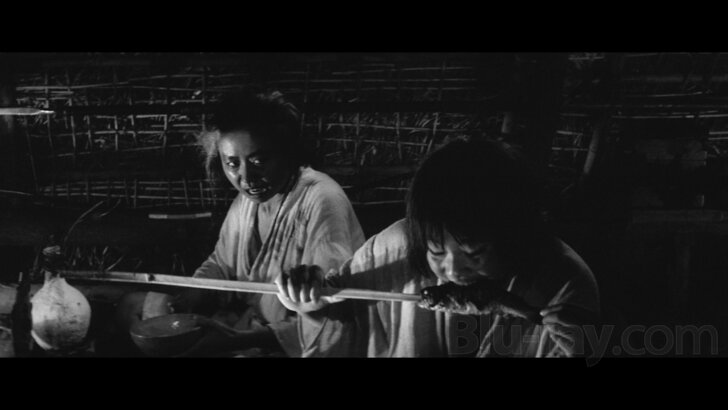
Feudal Japan, the 1400s. A bloody civil war has been underway for years. No one remembers how it started and no one knows when it will end. At one point in the film it is said that the casualties are so great that a black sun has risen in Kyoto.
Deep into the countryside, a samurai’s mother (Nobuko Otowa, Lost Sex, The Strangling) and wife (Jitsuko Yoshimura, Pigs & Battleships, Manji) have built a small house in the middle of a giant susuki grass field. They feel safe there because no one can see them from afar.
Occasionally, exhausted samurai retreat in the area to rest. The mother and her daughter-in-law kill them and throw their bodies in a large pit. Then they exchange their armor and weapons for food and saki. The two women have become so good in the art of killing that no one that enters the grass field leaves it alive.
During a hot summer day, Hachi (Kei Sato, Harakiri), a neighbor who long time ago also went to war, returns home with bad news -- the samurai was killed in a bloody battle. At first the two women refuse to believe Hachi, but the more time he spends with them, the more convinced they become that he really witnessed the death of the man they have been waiting to come home.
Soon after, Hachi seduces the younger woman. Fearing that he would convince her to become his wife, the older woman warns her that all sinners eventually end up in purgatory. When she ignores the warning, the older woman decides to teach her an important lesson.
This legendary Japanese film directed by Kaneto Shindo (The Naked Island) was inspired by a Buddhist tale, but religion does not have a commanding presence in it. The film is concerned primarily with ethical, moral, and socio-political issues.
A self-described socialist, Shindo viewed capitalism as a closed system which, among other things, promoted self-destruction. Unsurprisingly, in Onibaba, an allegorical exploration of capitalism, the main protagonists are part of an inhumane supply-and-demand system which has determined how they live their lives. Killing and trading, in particular, are viewed by the main protagonists as essential for their survival activities.
As the film progresses, right and wrong are completely redefined. At some point all three protagonists are faced with a difficult dilemma, which they solve, but only after they seriously compromise themselves. With their human masks off, they become wild animals left with no other option but to self-destruct. Having made his point, Shindo turns the camera away from them and the film simply stops.
Cinematographer Kiyomi Kuroda’s (Shindo’s The Naked Island, Kuroneko) lensing is simple but elegant. The wider panoramic shots showing the susuki grass bending in the wind are especially beautiful. Shadow and light are also effectively used during the nighttime sequences where the demon appears.
The film’s atmospheric soundtrack was composed by long-time Shindo collaborator Hikaru Hayashi (The Life of Chikuzan, Postcard).
*In 1965, Onibaba won Blue Ribbon Awards for Best Supporting Actress (Jitsuko Yoshimura) and Best Cinematography (Kiyomi Kuroda).
Onibaba Blu-ray Movie, Video Quality 
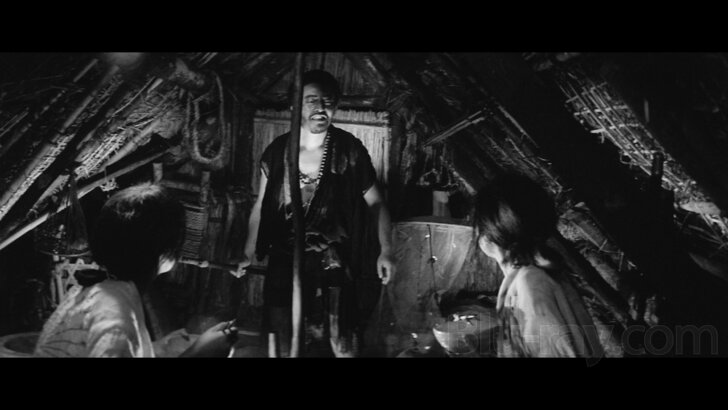
Presented in an aspect ratio of 2.39:1, encoded with MPEG-4 AVC and granted a 1080p transfer, Onibaba arrives on Blu-ray courtesy of Criterion.
Criterion's release is sourced from the same master that the folks at Eureka Entertainment worked with to produce this Region-B release of Onibaba in 2013. I think that the master is quite nice, though it has to be said that Onibaba has some very unique stylization that makes it quite difficult to tell precisely how certain areas of it are supposed to look. For example, it is easy to see that in select darker areas the blacks are elevated a tad too much and as a result there is some light crushing. However, in some of the same areas there are layers of thick dark nuances and shadows that appear to have been intentionally emphasized as well, so there is overlapping of blacks that is very difficult to analyze. On top of this, the master reveals density fluctuations that cause other types of unevenness in many of the same darker areas. Some of the visuals are a tad softer that I would have preferred as well, but overall the film has a fine organic appearance. Image stability is good. There are no distracting age-related imperfections. However, on this release a few of the darker areas could have used encoding optimizations because I noticed on my system how they were on the verge of producing macroblocking patterns. (Note: This is a Region-A "locked" Blu-ray release. Therefore, you must have a native Region-A or Region-Free player in order to access its content).
Onibaba Blu-ray Movie, Audio Quality 
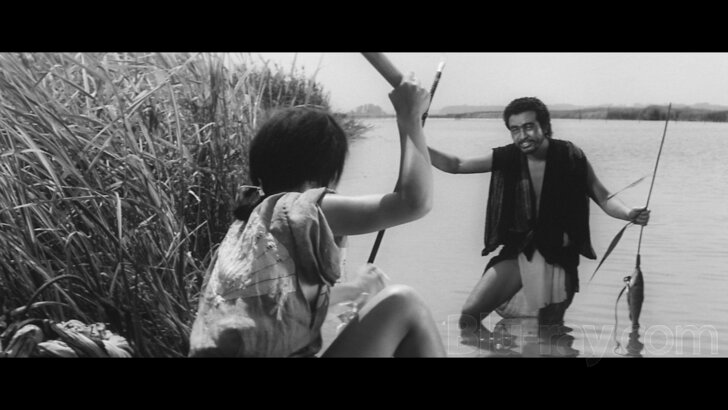
There is only one standard audio track on this Blu-ray release: Japanese LPCM 1.0. Optional English subtitles are provided for the main feature. When turned on, they appear inside the image frame.
The dialog is very basic and easy to follow. Some unevenness exists, but I assume that it is inherited. Occasionally some extremely light background hiss tries to sneak in, though I don't think that it ever becomes distracting. Predictably for a period Japanese film from the early 1960s,
dynamic intensity is quite modest.
Onibaba Blu-ray Movie, Special Features and Extras 
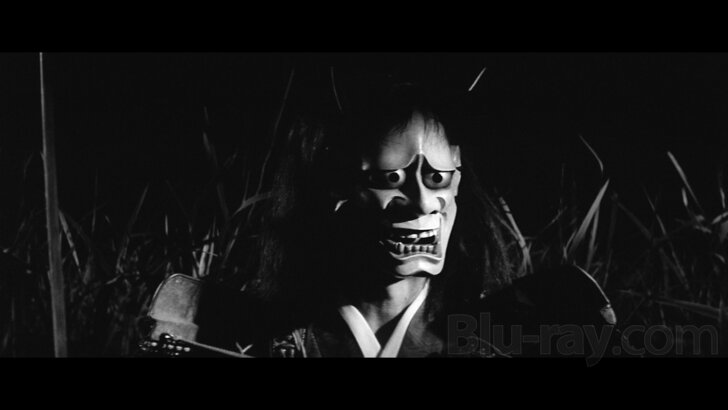
- Kaneto Shindo - in this archival video interview, director Kaneto Shindo discusses the production of Onibaba as well as the evolution of his career in Japan. The interview was conducted for Criterion in 2003. In Japanese, with optional English subtitles. (22 min).
- Commentary - this audio commentary, which was recorded in 2001, features director Kaneto Shindo and actors Kei Sato and Jitsuko Yoshimura. The commentary initially appeared on Eureka Entertainment's DVD release of Onibaba. In Japanese, with optional English subtitles.
- Trailer - original Japanese trailer for Onibaba. In Japanese, with optional English subtitles. (3 min, 1080p).
- On-Set Footage - presented here is super-8mm black & white footage shot by actor Kei Sato (Hachi) during the filming of Onibaba in the summer of 1964. Without sound. (38 min).
- Booklet - an illustrated booklet featuring an essay by film critic Elena Lazic, a 2001 director's statement by Kaneto Shindo, and a version of the Buddhist fable that inspired the film.
Onibaba Blu-ray Movie, Overall Score and Recommendation 
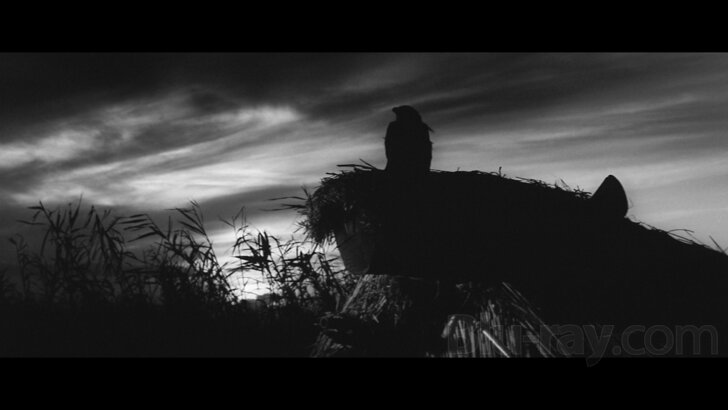
Out of all the classic Japanese films that have transitioned to Blu-ray Onibaba may very well be the most atmospheric one. Kuroneko offers quite an experience as well, but there are certain folk elements in it that tone down the disturbing and emphasize the poetic to give it a conventional genre identity and make it appeal to a particular audience. Onibaba is a very fluid film that was conceived to impress a different, much more diverse and mature audience, and this is essentially the reason why what takes place in works a little better. Criterion's upcoming release is sourced from an older but quite nice master and features a good selection of archival bonus features. HIGHLY RECOMMENDED.
Similar titles
Similar titles you might also like

Kuroneko
藪の中の黒猫 / Yabu no naka no kuroneko
1968

Kwaidan
怪談 | Kaidan | Original Cut
1965

The Ballad of Narayama
Narayama bushikô
1983

Beanpole
Дылда / Dylda
2019

Young & Beautiful
Jeune et jolie / Slipcover in Original Pressing
2013

Harakiri
切腹 / Seppuku
1962

Beyond the Hills
După dealuri
2012

Mademoiselle
1966

Possession
Special Edition
1981

Trauma
2017

The Rocket
2013

Dark Water
Honogurai mizu no soko kara
2002

Throne of Blood
蜘蛛巣城 / Kumonosu-jô
1957

The Life of Oharu
西鶴一代女 / Saikaku ichidai onna
1952

Through a Glass Darkly
Sĺsom i en spegel
1961

The Silence
Tystnaden
1963

Sansho the Bailiff
山椒大夫 / Sanshô dayű
1954

Ordet
1955

Viy
Вий / Spirit of Evil
1967

The Painted Bird
Nabarvené ptáce / Slipcover in Original Pressing
2019